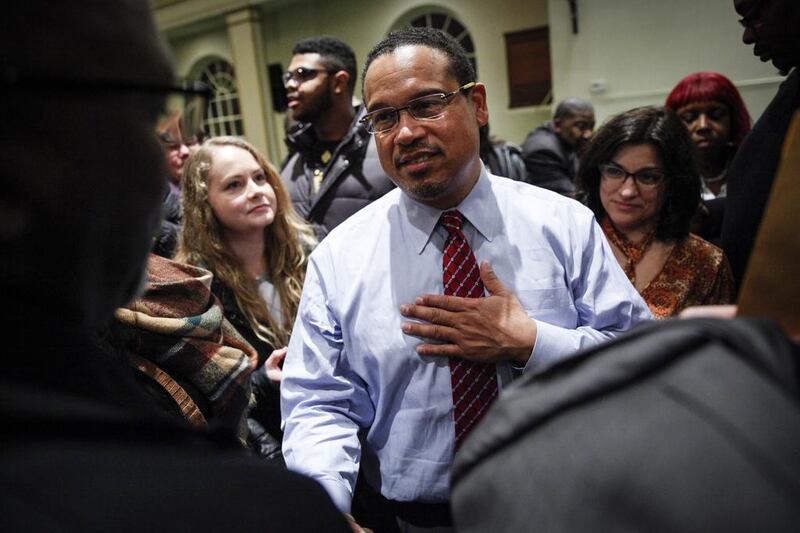Like many other progressives, I was disappointed that congressman Keith Ellison lost the election to be the next chair of the United States Democratic National Committee to former labour secretary Tom Perez. I was disappointed, but not distraught. Here’s why.
It was clear from the outset that Mr Ellison wouldn’t have an easy go of it. The party insiders, operatives, and major corporate donors were never going to surrender the reins of control without a fight.
During the course of the campaign, the congressman was subjected to deeply disturbing and even vicious attacks. Some disgustingly questioned why Democrats would want to elect an African-American Muslim as chair when the party needed to win votes from the “white working class”.
It was equally troubling that conservative elements in the Jewish community baited Mr Ellison as anti-Israel and shamefully quoted articles he had written as a young student, terming him “extremist”, “anti-Semitic” or “a bigot”. Building on these attacks, some then questioned whether with all these “strikes against him”, he could raise the funds the party would need to win elections.
Despite this slander, Mr Ellison won 200 votes out of 435 votes cast in the contest. Many who cast their ballot for him were repulsed and embarrassed by the attacks and wanted to send a strong message of support for and confidence in his leadership. They understood that he represented a new generation of Democrats and that he was a principled progressive leader who could unify the party and an effective organiser who knew how to win elections.
While those who slandered Mr Ellison are now gloating over his defeat, in fact, it is they who were the losers in this contest. Because the congressman took the high road and did not sink to the level of his attackers, he emerged as the leader and unifier, while they have been exposed as dividers and bigots. By naming Mr Ellison as deputy chair, Tom Perez delivered the ultimate repudiation.
Another reason not to be distraught is because this was never an ideological contest between competing political philosophies. Progressive ideas didn’t lose. Listening to the debates among those who ran for the several leadership positions being contested in this election, it became clear that the “Bernie agenda” of the 2016 presidential race has become the dominant programme of the party. It has eclipsed the now discredited Clinton-era centrist agenda.
The new chairman, Tom Perez, will be a champion for change. He and Mr Ellison will join together to advocate policies that will support workers’ rights and women’s rights, protect the environment, support quality health care for all, improve the public education system, bring justice to the criminal justice system, and advocate policies that keep the American people safe and secure, while protecting their civil and political rights.
When some Democrats said that they wanted the chair to be a full-time job, Mr Ellison responded that, if elected, he would resign from his seat in Congress. It’s important that Mr Ellison will not now be forced to honour that pledge. He will remain in Congress where his voice as a leader of the progressive caucus is needed more than ever. In many ways this campaign has served to catapult him into a national leadership role. He didn’t lose. Instead, he has become a leader in the party and will now be an even stronger voice in Congress.
Finally, there’s no reason to be distraught because the fight to change the party and our politics is just beginning. As I noted, this contest was not about differences in policy. It was a continuation of the insurgent campaign run by Mr Sanders that was focused on reforming our politics and making the Democratic Party more responsive to its grass roots and less attentive to its donor class. As Mr Sanders demonstrated in 2016 by raising over US$200 million from small donors, it is possible for Democrats to be competitive by relying on principled ideas, trusted leadership, and grass roots organisation.
This movement continues to manifest itself almost daily, as evidenced by the mass demonstrations that greeted the inauguration of Donald Trump; that gathered in airports to welcome refugees and immigrants in defiance of Mr Trump’s executive orders; that have denounced the new administration’s Islamophobia and tolerance of anti-Semitism; and that have challenged Republican efforts to gut health-care reform.
Given this, I can’t feel distraught. Instead, I’m hopeful. Democrats have a progressive chair and deputy chair; a true progressive retains his position in Congress, and the movement for change is alive and well. The donor class and party “establishment” may have had their last hurrah. The country and the party are changing and there’s no going back to the “good old days”.
Dr James Zogby is president of the Arab American Institute
On Twitter: @aaiusa





